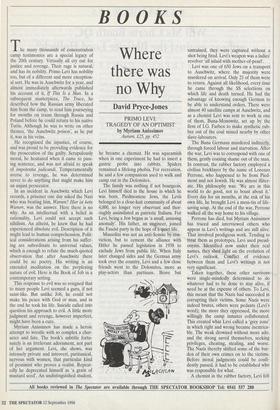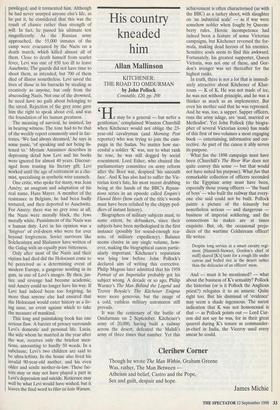BOOKS
Where there was no Why
David Pryce-Jones
PRIMO LEVI: TRAGEDY OF AN OPTIMIST by Myriam Anissimov Aurum, £25, pp. 452 The many thousands of concentration camp testimonies are a special legacy of the 20th century. Virtually all cry out for justice and revenge. Their rage is natural, and has its nobility. Primo Levi has nobility too, but of a different and more exception- al sort. He was in Auschwitz for a year, and almost immediately afterwards published his account of it, If This Is a Man. In a subsequent masterpiece, The Truce, he described how the Russian army liberated him from the camp, to send him journeying for months on trains through Russia and Poland before he could return to his native Turin. Although he was to write on other themes, 'the Auschwitz poison', as he put it, was in his veins.
He recognised the injustice, of course, and was proud to be providing evidence for the prosecution of the guilty. Scrupulously moral, he hesitated when it came to pass- ing sentence, and was not afraid to speak of impotentia judicandi. Temperamentally averse to revenge, he was determined never to do anything that might make him an unjust persecutor.
In an incident in Auschwitz which Levi records, a prisoner one day asked the Nazi who was beating him, Warum? Hier ist kein Warum, was the answer. Here there is no why. As an intellectual with a belief in rationality, Levi could not accept such nihilism. An atheist, he knew that he had experienced absolute evil. Description of it might lead to human comprehension. Polit- ical considerations arising from his suffer- ing are subordinate to universal values, which is enough to refute the much-quoted observation that after Auschwitz there could be no poetry. His writing is an extended meditation on the perplexing nature of evil. Here is the Book of Job in a contemporary setting.
This response to evil was so resigned that to many people Levi seemed a guru, if not saint-like. But unlike Job, he could not make his peace with God or man, and in the end he took his life. Suicide called into question his approach to evil. A little more judgment and revenge, however imperfect, might have been a cure.
Myriam Anissimov has made a heroic attempt to wrestle with so complex a char- acter and fate. The book's subtitle fortu- nately is an irrelevant adornment, not part of her argument. Levi, she shows, was intensely private and introvert, puritanical, nervous with women, that particular kind of pessimist who proves a realist. Repeat- edly he deprecated himself as 'a grain of mustard seed'. An undistinguished student, he became a chemist. He was squeamish when in one experiment he had to insert a gastric probe into rabbits. Spiders remained a lifelong phobia. For recreation, he and a few companions used to walk and camp out in the Dolomites.
The family was nothing if not bourgeois. Levi himself died in the house in which he was born. Piedmontese Jews, the Levis belonged to a close-knit community of about 4,000, no longer very observant and thor- oughly assimilated as patriotic Italians. For Levi, being a Jew began as 'a small, amusing anomaly'. His father, an engineer, joined the Fascist party in the hope of"a quiet life.
Mussolini was not an anti-Semite by con- viction, but to cement the alliance with Hitler he passed legislation in 1938 to exclude Jews from public life. When Italy later changed sides and the German army took over the country, Levi and a few close friends went to the Dolomites, more as play-actors than partisans. Brave but untrained, they were captured without a shot being fired. Levi's weapon was a ladies' revolver 'all inlaid with mother-of-pearl'.
Levi was one of 650 Jews on a transport to Auschwitz, where the majority were murdered on arrival. Only 23 of them were to return. Against all likelihood, every time he came through the SS selections on which life and death turned. He had the advantage of knowing enough German to be able to understand orders. There were almost 40 satellite camps at Auschwitz, and as a chemist Levi was sent to work in one of them, Buna-Monowitz, set up by the firm of I.G. Farben to make synthetic rub- ber out of the coal mined nearby by other slave-labourers.
The Buna Germans murdered indirectly, through forced labour and starvation. After the war, Levi was to correspond with one of them, gently coaxing shame out of the man. In contrast, the rubber factory employed a civilian bricklayer by the name of Lorenzo Perrone, who happened to be from Pied- mont and not Jewish. He was almost illiter- ate. His philosophy was: 'We are in this world to do good, not to boast about it.' Every day for six months, at the risk of his own life, he brought Levi a mess-tin of life- saving soup. At the end of the war, Perrone walked all the way home to his village.
Perrone has died, but Myriam Anissimov has traced and interviewed others who appear in Levi's writings and are still alive. That involved prodigious work. Tending to treat them as prototypes, Levi used pseud- onyms. Identified now under their real names, they shed light on the evolution of Levi's outlook. Conflict of evidence between them and Levi's writings is not very significant.
Taken together, these other survivors were single-mindedly determined to do whatever had to be done to stay alive, if need be at the expense of others. To Levi, this meant that the Nazis had succeeded in corrupting their victims. Some Nazis were indeed brutes, others were pedants (Levi's word); the more they oppressed, the more willingly the camp inmates collaborated. This created what Levi called a 'grey zone' in which right and wrong became inextrica- ble. The weak drowned without more ado, and the strong saved themselves, seeking privileges, cheating, stealing, and worse. The Nazis thereby shifted some of the bur- den of their own crimes on to the victims. Before moral judgments could be confi- dently passed, it had to be established who was responsible for what.
A chemist in the rubber factory, Levi felt privileged, and it tormented him. Although he had never usurped anyone else's life, as he put it, he considered that this was the result of chance rather than strength of will. In fact, he passed his ultimate test magnificently. As the Russian army approached, the 55,000 inmates of the camp were evacuated by the Nazis on a death march, which killed almost all of them. Close to death himself from scarlet fever, Levi was one of 850 too ill to leave Auschwitz. The guards did not have time to shoot them, as intended, but 700 of them died of illness nonetheless. Levi saved the lives of those in his barracks by stealing as creatively as anyone, but only from the absconding Nazis. Not one of the drowned, he need have no guilt about belonging to the saved. Rejection of the grey zone gave him the right to speak about evil, and was the foundation of his human greatness.
The meaning of survival, he insisted, lay in bearing witness. The tone had to be that of the weekly report commonly used in fac- tories. 'We had always dreamed,' he says in some panic, 'of speaking and not being lis- tened to.' Myriam Anissimov describes in depressing detail how Levi and his books were ignored for almost 40 years. Discour- aged from trusting his literary gift, Levi worked until the age of retirement as a che- mist, specialising in synthetic wire enamels.
One critic, who spoke for many, was Jean Amery, an anagram and adaptation of his real name, Hans Mayer. A member of the resistance in Belgium, he had been badly tortured, and then deported to Auschwitz. For Amery: there was no grey zone at all, the Nazis were morally black, the Jews morally white. Punishment of the Nazis was a human duty. Levi in his opinion was a 'forgiver' of evil-doers who were for ever beyond forgiveness. Soviet survivors like Solzhenitsyn and Shalamov have written of the Gulag with an equally pure bitterness.
Only after most of the Nazis and their victims had died did the Holocaust come to be perceived as a determining event of modern Europe, a gangrene nestling in its guts, in one of Levi's images. By then, jus- tice and revenge had become academic, and Amery could no longer have his way. If Levi had indeed been too forgiving, he more than anyone else had ensured that the Holocaust would enter history as a liv- ing issue, an event against which to take the measure of mankind.
This long and painstaking book has one serious flaw. A barrier of privacy surrounds Levi's domestic and personal life. Lucia, the wife whom he married in the year after the war, receives only the briefest men- tions, amounting to hardly 50 words. In a subclause, Levi's two children are said to be ultra-leftists. In the house also lived his invalid 90-year-old mother, and his even older and senile mother-in-law. These fac- tors may or may not have played a part in Levi's depression and suicide. Reticence may well be what Levi would have wished, but it leaves the final word to Hier 1st kein Warum.



































































 Previous page
Previous page